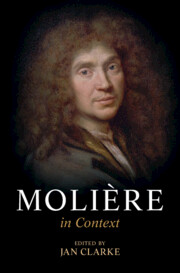Book contents
- Molière in Context
- Molière in Context
- Copyright page
- Dedication
- Contents
- Figures
- Charts and Tables
- Contributors
- Acknowledgements
- Translations
- Abbreviations
- Biographical Preface
- Part I Socio-Political Context
- Chapter 1 A Bourgeois at Court
- Chapter 2 The Religious Climate
- Chapter 3 Medicine
- Chapter 4 Family Law
- Chapter 5 Women
- Chapter 6 Gender, Masculinity and Cross-Dressing
- Part II Intellectual and Artistic Context
- Part III Theatrical Context (Paris)
- Part IV Theatrical Context (Court)
- Part V Reception and Dissemination
- Part VI Afterlives
- Further Reading
- Index
Chapter 2 - The Religious Climate
from Part I - Socio-Political Context
Published online by Cambridge University Press: 10 November 2022
- Molière in Context
- Molière in Context
- Copyright page
- Dedication
- Contents
- Figures
- Charts and Tables
- Contributors
- Acknowledgements
- Translations
- Abbreviations
- Biographical Preface
- Part I Socio-Political Context
- Chapter 1 A Bourgeois at Court
- Chapter 2 The Religious Climate
- Chapter 3 Medicine
- Chapter 4 Family Law
- Chapter 5 Women
- Chapter 6 Gender, Masculinity and Cross-Dressing
- Part II Intellectual and Artistic Context
- Part III Theatrical Context (Paris)
- Part IV Theatrical Context (Court)
- Part V Reception and Dissemination
- Part VI Afterlives
- Further Reading
- Index
Summary
Seventeenth-century France was not a place of religious tolerance or inclusion. Jewish people were permitted to settle, under certain restrictions, in parts of the country, and France enjoyed trading and diplomatic relations with, notably, the Ottoman Turks. But both Judaism and Islam were regarded with great suspicion in a country that claimed to base its unity on having one faith, one law and one king. For this reason, the French Protestant (or Huguenot) community came under increasing levels of persecution in Molière’s lifetime. Even within the Catholic Church, there was considerable tension. Louis XIV’s authority was threatened by that of the Pope in Rome and, in France, by the Jansenists, who did not recognize the King’s right to pronounce on matters of individual conscience. More generally, France was steeped in a wider conflict between those who believed that religion should guide all areas of daily life (the dévots) and those who adopted a more relaxed view (the mondains). Although there is no reason to think that Louis XIV objected to Molière’s portrayal of religion and religious hypocrisy in his famous comedy Tartuffe (1664–9), the play thus became caught up in a much broader struggle for religious and political authority.
Keywords
- Type
- Chapter
- Information
- Molière in Context , pp. 28 - 35Publisher: Cambridge University PressPrint publication year: 2022

